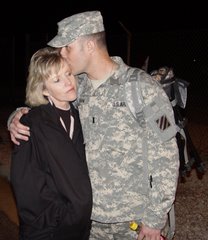 A Soldier from 1st platoon, Company B, 3rd Squadron, pulls security during a
A Soldier from 1st platoon, Company B, 3rd Squadron, pulls security during anight mission on July 3.
 1st Lt. James Self, 24, Mobile, Ala., platoon leader for 1st platoon, Company B, 3rd Squadron, briefs his Soldiers before going out on a night mission on July 3.
1st Lt. James Self, 24, Mobile, Ala., platoon leader for 1st platoon, Company B, 3rd Squadron, briefs his Soldiers before going out on a night mission on July 3.FOR IMMEDIATE RELEASE
RELEASE No. 20070710-2
July 10, 2007
3-1 Cavalry pushes into the night
Story and photos by Spc. Ben Hutto
3rd HBCT Public Affairs
Multi-National Division – Center PAO
FORWARD OPERATING BASE HAMMER, Iraq — Soldiers of Company B, 3rd Squadron, 1st Cavalry Regiment, listened intently as 1st Lt. James Self, of Mobile, Ala., the platoon leader of 1st platoon, gave his mission brief in the glow of humvee headlights.
Company B would be going to the small town of Hollandia to kill or capture
an individual believed to be involved with an improvised explosive device network operating in the area.
This was not their first night mission since arriving at FOB Hammer three months ago, but every face was a picture of concentration and focus. Within moments, the brief would be over and the Soldiers would go to their separate vehicles.
One by one Soldiers killed the lights on their humvees as they drove outside the wire. The Soldiers’ night vision goggles turned the landscape into a green world that can be seen clearly.
“They are doing well (on night missions),” said Self. “They continually get excited when they hear we have one coming up. I’d say we are more comfortable doing them, to be honest.”
Capt. David Smith, of Grand Rapids, Mich., commander of Company B, agreed with Self’s assessment.
“That’s how we train,” he explains. “At the NTC (National Training Center) and Hammer Focus we got our guys used to using the (night vision goggles) in the blackest of conditions. It’s like second nature to them now. They are all comfortable using them.”
As the convoy moved toward Hollandia, Smith gave his views on Hollandia. “I like this town,” he said. “The kids here are awesome. When we come out here during the day, they are all over the place.”
If it sounds like the relationship between Hollandia and 3-1 Cavalry is good, it is because of the work that Smith and his team have put into that relationship.
Smith explained, “When we first arrived there, the locals’ reaction to us was cold; neutral at best. Now they are very friendly. We’ve arrested a few bad guys out here. We’ve started a few projects in the area. The people here have faith that we are going to do what we say we will. They know we are going to capture the bad guys. They have no problem telling us when someone who isn’t supposed to be in the town is there.”
The convoy rolled into the town around 11:30 p.m. The men in the town came out and began talking with the Soldiers through interpreters. Soldiers began spreading out and looking for their target.
“A scout’s motto is that we own the night,” said Spc. Aaron Quitugah, from Irvine, Calif., a scout with Company B. “On a mission like this, we can scout around the town and see in places where people think they can hide. We have the advantage, definitely.”
After several hours of searching, the Soldiers were unable to find their target. Leaders of Company B don’t view that as a bad thing, however. “We try to be a friendly presence out here,” said Self. “We got good information tonight even though our target wasn’t there. It’s important that the people here see us and know we are out there at night looking out for them. They are comfortable with us. When we stop people at night now, they don’t seem nervous. They feel comfortable that we are out here. They talk to us. That gets us good information so we can do our job better.”
As silently as they came into the town, they move out. “We think there are caches out there,” said Smith. “That mission will help us later. We will continue to use our relationships we are making out there to find them. The local populations help is critical.”
Quitugah agrees with his commander’s assessment and remains ready to deal with the slow nights as well as the busy ones.
“This last mission went okay,” he said. “When we first got here, we thought trouble would push our way from Baghdad and it hasn’t happened yet. A lot of us feel like something big will happen and we are ready for it. We are staying on our toes because some big cells will be pushed out of Baghdad to the smaller places like this. They won’t be farmers or shoemakers; they will be the professionally trained fighters. We will be ready for them.”





No comments:
Post a Comment